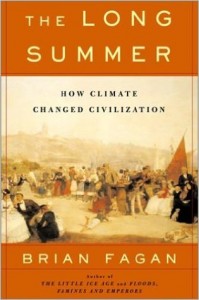 The Long Summer of the title is the Holocene warming trend of the last 15,000 years, which has coddled humanity throughout recorded history. Anthropologist Brian Fagan uses scientific information to walk readers through the major climatic changes in human history, including droughts that led to the formation of the first cities, rainfall increases connected to the spread of bubonic plague, and volcanic eruptions that triggered disastrous cooling trends. These examples prove humans have been increasingly vulnerable to climate change ever since we left a nomadic lifestyle for an agriculture-based one. Fagan provides a detailed history of the city of Ur, in what is now modern-day Iraq. Once a great city in one of the world’s earliest civilizations, it first thrived thanks to abundant rainfall and then suffered even more severely when the Indian Ocean monsoons shifted southward, changing rain patterns. By 2000 B.C. its agricultural economy had collapsed, and today it is an abandoned landscape in the harshest of deserts. Fagan views this event as pivotal as it was, “the first time an entire city disintegrated in the face of environmental catastrophe.” But not the last. Fagan doesn’t offer easy solutions, but he presents a compelling history of climate’s role in the background– and sometimes foreground–of human history. Part cautionary tale and part historical detective story, The Long Summer encourages readers to appreciate the increasingly clear links between great weather changes and human society, politics and survival.
The Long Summer of the title is the Holocene warming trend of the last 15,000 years, which has coddled humanity throughout recorded history. Anthropologist Brian Fagan uses scientific information to walk readers through the major climatic changes in human history, including droughts that led to the formation of the first cities, rainfall increases connected to the spread of bubonic plague, and volcanic eruptions that triggered disastrous cooling trends. These examples prove humans have been increasingly vulnerable to climate change ever since we left a nomadic lifestyle for an agriculture-based one. Fagan provides a detailed history of the city of Ur, in what is now modern-day Iraq. Once a great city in one of the world’s earliest civilizations, it first thrived thanks to abundant rainfall and then suffered even more severely when the Indian Ocean monsoons shifted southward, changing rain patterns. By 2000 B.C. its agricultural economy had collapsed, and today it is an abandoned landscape in the harshest of deserts. Fagan views this event as pivotal as it was, “the first time an entire city disintegrated in the face of environmental catastrophe.” But not the last. Fagan doesn’t offer easy solutions, but he presents a compelling history of climate’s role in the background– and sometimes foreground–of human history. Part cautionary tale and part historical detective story, The Long Summer encourages readers to appreciate the increasingly clear links between great weather changes and human society, politics and survival.
